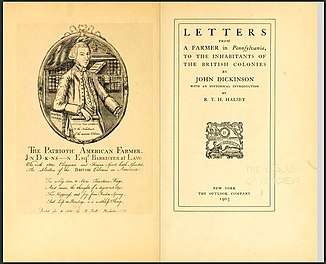Letters from a Farmer in Pennsylvania
Letters from a Farmer in Pennsylvania is a series of essays written by the Pennsylvania lawyer and legislator John Dickinson (1732–1808) and published under the pseudonym "A Farmer" from 1767 to 1768. The twelve letters were widely read and reprinted throughout the thirteen colonies and were important in uniting the colonists against the Townshend Acts. According to many historians, the impact of the Letters on the colonies was unmatched until the publication of Thomas Paine's Common Sense in 1776,[1] and the success of the letters earned Dickinson considerable fame.[2]

Letters from a farmer in Pennsylvania, to the inhabitants of the British Colonies
Background
The passage of the Stamp Act of 1765 ignited a dispute over the authority of the British Parliament to levy internal taxes on its colonies. Facing opposition both from American colonists and British merchants, and under the leadership of a new ministry, Parliament repealed the Stamp Act in 1766. However, Parliament at the same time passed the Declaratory Act, which affirmed its authority to tax the colonies. In 1767, Parliament imposed import duties — remembered as the Townshend Acts — on a range of goods imported by the colonies, for the purpose of raising revenue. These duties reignited the debate over Parliamentary authority.
John Dickinson, a wealthy Philadelphia lawyer and member of the Pennsylvania assembly,[1] set out to clarify the Constitutional question of Parliament's authority to tax the colonies, and to urge the colonists to moderate action in order to oppose the Townshend Acts. His Letters were first published in the Pennsylvania Chronicle, and then reprinted in most newspapers throughout the colonies.[1]
The Letters
While acknowledging the power of Parliament in matters concerning the whole British Empire, Dickinson argued that the colonies were sovereign in their internal affairs. He thus argued that taxes laid upon the colonies by Parliament for the purpose of raising revenue, rather than regulating trade, were unconstitutional. Dickinson argued that the Townshend Acts, though nominally import duties, were intended to raise revenue, rather than to regulate trade. Dickinson further argued that by passing the duties, Parliament intended to establish its authority to tax the colonies and to test the response of the colonists:[1]
Upon the whole, for my part, I regard the late act as an experiment made of our disposition. It is a bird sent over the waters, to discover, whether the waves, that lately agitated this part of the world with such violence, are yet subsided. If this adventurer gets footing here, we shall quickly be convinced, that it is not a phenix; for we shall soon see it followed by others of the same kind. We shall find it rather to be of the breed described by the poet—
"Infelix vates."
A direful foreteller of future calamities.
— Letter XI
In his letters, Dickinson foresaw the possibility of future conflict between the colonies and Great Britain, but cautioned against the use of violence, except as a last resort:
If at length it becomes undoubted that an inveterate resolution is formed to annihilate the liberties of the governed, the English history affords frequent examples of resistance by force. What particular circumstances will in any future case justify such resistance can never be ascertained till they happen. Perhaps it may be allowable to say generally, that it never can be justifiable until the people are fully convinced that any further submission will be destructive to their happiness.
— Letter III
In contrast to much of the rhetoric of the time, the letters were written in a mild tone.[1] In order to secure the repeal of the Townshend duties, Dickinson proposed putting pressure on Britain by reducing imports, both through frugality and the purchase of local manufactures.[1]
The style of Dickinson's Letters is often contrasted with that of Paine's Common Sense. A. Owen Aldridge compares Dickinson's style to that of the English essayist Joseph Addison, and Paine's style to that of Jonathan Swift. Aldridge also notes the more pragmatic and less philosophical emphasis of Dickinson's Letters, which are less concerned with basic principles of government and society than Paine's Common Sense, and instead focus more on immediate political concerns.[3]
References
- Middlekauff, Robert (2007). The Glorious Cause: The American Revolution, 1763-1789. Oxford University Press. ISBN 9780199740925.
- Early History of the Falls of Schuylkill, Manayunk, Schuylkill and Lehigh Navigation Companies, Fairmount Waterworks, Etc., by Chrles V. Hagner, 1869, reprinted by the University of Michigan, 2010
- Aldridge, A. Owen (1976). "Paine and Dickinson". Early American Literature. 11 (2): 125–138.
External links
- Dickinson, John; Halsey, R. T. Haines (Richard Townley Haines) (1903). Letters from a farmer in Pennsylvania, to the inhabitants of the British Colonies. New York, The Outlook company.
